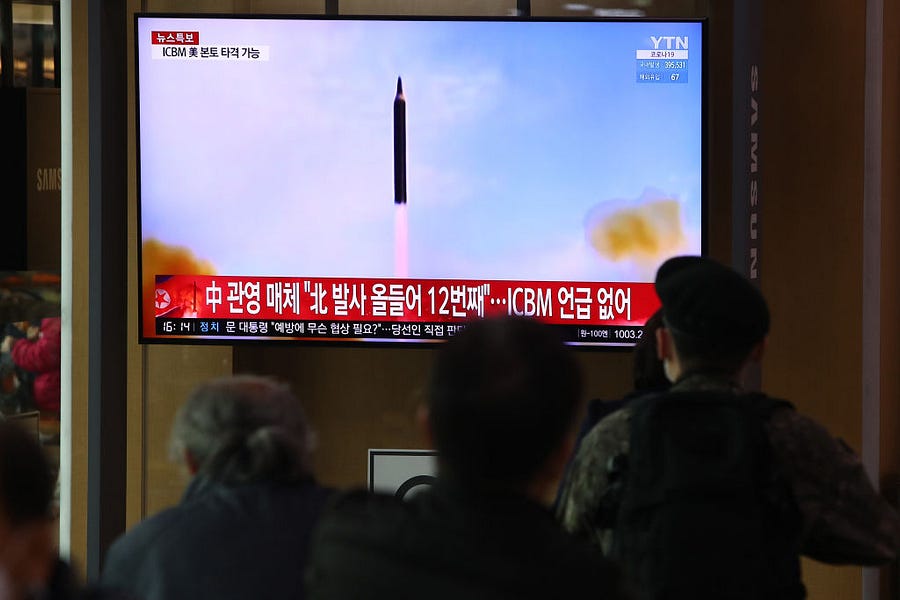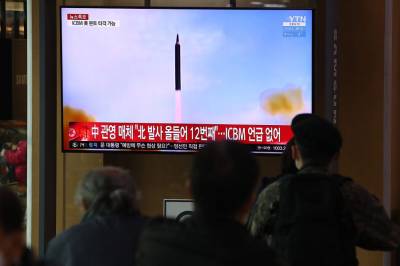A serious problem does not go away if you ignore it. It instead grows uncontrollably. Case in point: President Joe Biden has largely ignored North Korea’s advancing nuclear, missile, and military programs. And last week, as Biden prepared for important meetings with NATO over Russia’s invasion of Ukraine, North Korean dictator Kim Jong-un successfully launched an intercontinental ballistic missile for the first-time in half a decade. Japanese Prime Minister Fumio Kishida called the launch an act of “unforgivable recklessness.”
Kim’s message was clear: Ignoring Pyongyang has costs. An ICBM test by North Korea should serve as an inflection point in U.S. policy. It’s now on the Biden administration to prove that such actions come with consequences and assiduously rebuild the coalition for pressure to blunt Kim’s weapons programs and extortion efforts.
North Korea’s latest ICBM launch follows a failed March 16 ICBM test. It is the clearest sign of the collapse of Kim’s self-imposed moratorium on long-range ballistic missile testing. Earlier this year, on February 26 and March 4, Kim conducted at least two launches using what U.S. officials called ICBM-related technology as part of a new missile system. An unnamed senior administration official called those launches a “serious escalation.” Kim is likely to have combined elements from these launches in his latest ICBM test.
Foreign military sources claim the missile, fired in a lofted trajectory, reached a peak altitude of 6,200 kilometers while flying for 71 minutes. Missiles fired on a lofted trajectory travel shorter horizontal distances. But the latest missile launch implies that Kim could fire the weapon at the continental U.S. on a normal ballistic trajectory. In late January, Kim also fired an intermediate-range ballistic missile known as Hwasong-12 otherwise capable of reaching Guam. North Korea has launched over a dozen missiles this year.
Although there is some debate as to the exact weapon that was tested, North Korea is working on a larger ICBM that can carry multiple warheads, potentially with the goal of being able to target multiple sites in the United States with one missile. Other military capabilities the North is developing include hypersonic missiles, as well as long-range land-attack cruise missiles. Cruise missile launches are not banned by U.N. Security Council Resolutions (UNSCRs) on North Korea, which instead narrowly focus on ballistic missiles.
In the face of all these developments and the most recent ICBM test, the Biden administration continues to claim that “the door has not closed for diplomacy.” While the administration deserves the lion’s share of the blame for the state of U.S. policy, pressure against Pyongyang began to atrophy in 2018 when then-President Donald Trump embraced high-level diplomatic engagement as the cornerstone of his North Korea policy. Biden has built on his predecessor’s approach and highlighted in public and private its willingness to negotiate with North Korea. Kim has rejected these overtures and continued development of his prohibited programs.
The only realistic option for Washington is a punitive one. Critics will suggest that pressure does not work on Kim and that North Korea will never relinquish its nuclear weapons program. The Obama administration increased pressure on Pyongyang in 2016 and the Trump administration escalated that policy through 2018. There is no question that Kim was worried that the mounting financial, political, and military pressure at that time would threaten his hold on power. Mounting pressure was likely why Kim agreed to the leader-level summits.
And while denuclearization of North Korea remains the ultimate goal of U.S.-North Korea policy, sanctions can achieve important policy goals in the interim. These include reducing the funding available for Kim’s nuclear and missile programs and making material inputs for those programs harder and costlier to procure and produce.
A robust pressure policy on Pyongyang should begin with rebuilding a diplomatic coalition. The Biden administration announced last Friday that it will introduce a new sanctions resolution to “update and strengthen the sanctions regime.” At present, the U.N. Security Council is a lost cause because Russia and China will veto the U.S. resolution and prevent any additional UNSC action.
In the absence of a new resolution, the U.S. mission to the United Nations issued another strong statement on Friday, as it has done several times this year following Pyongyang’s missile launches. Unfortunately, even those non-controversial statements highlight the fractured nature of a once strong diplomatic consensus against the Kim regime. The administration has been unable to persuade more than eight Council members to support these statements.
Pivoting to financial pressure, Washington should quickly focus its sanctions efforts on three key areas: cutting access to the international financial system, impeding overseas sanctions busting and procurement networks, and cracking down on the illicit energy trade. Rather than meting out this punishment gradually, the Biden administration should do this all at once and with the same if not greater zeal that it is showing on the Russia sanctions front to make sure Kim gets the message.
First, the Treasury Department should in public and private warn financial institutions that they will lose access to the U.S. financial system if they support North Korean trade or sanctioned programs. Critics may counter that Biden should not isolate China and other countries that may be needed to support sanctions against Russia. Yet opposite is true, strong action on North Korea will reinforce the notion that Biden is serious about sanctions enforcement across the board.
Similarly, if the U.S. Treasury or the Justice Departments have identified Chinese, Russian, or other financial institutions aiding North Korea, now is the time to take action against these actors to both expose and penalize their activities.
The next target should be North Korea’s overseas diplomatic, financial, and commercial representatives. The Biden team should insist that countries implement, at a minimum, U.N. sanctions requiring the expulsion of representatives of designated entities or persons engaged in sanctions busting or illicit procurement. Every North Korean diplomat and representative may have the ability to engage in some form of sanctions evasion. If U.S. allies continue to harbor these representatives, Biden should consider sanctions against them or even a potential reduction in U.S. aid.
The final target should be Pyongyang’s longstanding track-record of violating Security Council sanctions by exporting coal and importing refined petroleum. The U.S. 7th Fleet participates in the Enforcement Coordination Cell, a multinational coalition (U.S., Australia, Canada, New Zealand, United Kingdom, Japan, France, and Germany) that monitors violations of U,N, maritime sanctions. The U.S. should warn China that it must stop these transfers and if they do not the administration will switch from monitoring sanctions violations to interdicting these vessels.
Congress has a role to play too. North Korea sanctions passed both chambers with overwhelming majorities in 2016, 2017, and 2019. House and Senate foreign affairs and banking committees should hold oversight hearings to investigate the reduction in sanctions pressure since 2018 and enforcement of mandatory sanctions.
An ICBM test is a direct threat to the U.S. homeland and should be treated as such. Biden cannot ignore North Korea’s evolving missile and nuclear capabilities in the hopes of them fading away. Fortunately, there is a blueprint of how to pressure Pyongyang already on file. The question is, will Washington reach for it before it is too late?
Anthony Ruggiero and Behnam Ben Taleblu are senior fellows at the Foundation for Defense of Democracies (FDD). Anthony previously served in the U.S. government for more than 19 years, most recently as senior director for counterproliferation and biodefense on the U.S. National Security Council. Follow Anthony on Twitter @NatSecAnthony. Behnam covers Iranian political and security issues at FDD as well as functional issues like nonproliferation and arms control.






Please note that we at The Dispatch hold ourselves, our work, and our commenters to a higher standard than other places on the internet. We welcome comments that foster genuine debate or discussion—including comments critical of us or our work—but responses that include ad hominem attacks on fellow Dispatch members or are intended to stoke fear and anger may be moderated.
With your membership, you only have the ability to comment on The Morning Dispatch articles. Consider upgrading to join the conversation everywhere.